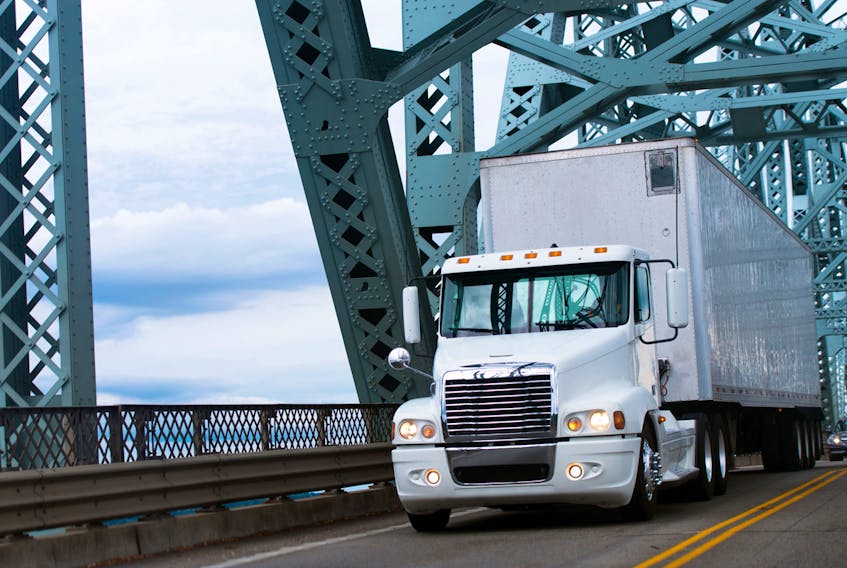Bud the Spud may not be rolling down the highway smiling when he tries to haul a load of P.E.I. potatoes across Quebec during certain times of the year, according the P.E.I. Potato Board.
Weight restrictions in Quebec during the spring thaw season are lower than those in Atlantic Canada, which means some transfer trucks transporting potatoes from P.E.I. to central Canada cannot be filled to capacity.
Quebec’s freight allowances can be as much as 30 per cent below those of the rest of Eastern Canada during times of imposed weight restrictions.
And given that the supply of trucks has become tighter over the last year, this has led to increased costs and headaches for potato producers and exporters.
It also affects industries that import goods into the province, says Greg Donald, general manager of the P.E.I. Potato Board.
“We get a lot of supplies, agriculture and potato products, that have to come in by truck, and they have to go through Quebec, so that means they aren’t able to haul as much during a period of the year, which increases the costs per unit, so it’s a cost issue for things coming here,” Donald said.
“And most certainly, when the trucks go back and are taking our potatoes or other products, they’re limited in what they can deliver.”
This is just one of a number of different weight restriction rules and inconsistencies in regulation that affect the transport of goods by road from Prince Edward Island the rest of Canada.
Erin McGrath-Gaudet, of the Canadian Federation of Independent Business, says industry groups have long been raising concerns about these internal trade barriers – concerns that have largely fallen on deaf ears.
“It can be things like different rules, different weight restrictions, sometimes things like different wide load signs being required in different provinces – all these things that add costs,” McGrath-Gaudet said.
Prince Edward Island businesses are especially impacted because the province cannot ship goods by rail, she said.
“We rely on trucking very heavily… but, frankly, it’s a big issue across Canada.”
Access to trucking for transporting goods has become increasingly challenging for industries across the region due in part to a shortage of drivers. Temporary foreign workers have been brought in to fill ongoing labour gaps in this area.
If a shipment of P.E.I. potatoes or seafood must be divided into two truckloads instead of one due to fluctuations in weight restrictions, this places further strain on the already short supply of trucks and drivers, McGrath-Gaudet said.
“If we can have one trucking going instead of two, if we can minimize our down time on the side of highway changing wide load signs, that would be a good thing. That’s why we’ve raised these kinds of issues.”
The provincial government, it seems, is finally listening.
P.E.I. has identified weight restriction concerns as a key priority area as it heads into negotiations between the provinces and territories as part of the recently renegotiated Canada Free Trade Agreement, which came into force July 1, 2017.
As part of that agreement, a regulatory reconciliation and cooperation table was struck to address concerns about inter-provincial trade barriers with an aim to harmonize regulation.
The province has conducted consultations with industry groups and is in the process of compiling a list of key priorities to bring to this table, in the hopes some of P.E.I.’s issues will make it to the national list of priorities to be negotiated and improved.
“This was the (issue) that came to the forefront, in terms of the weight restrictions,” said Kal Whitnell, senior director of economic research and trade negotiations. He pointed out this affects shipments of not only potatoes, but also other major food products for the province like fish and seafood, and other commodities.
“It was raised as a critical concern that with the weight restrictions, regulations do differ across the country,” Whitnell said.
“Obviously from our perspective, we’d like to get this on the (national) list and that’s our goal and objective and we’ll be aiming to do that, but as I said, it is a negotiation.”
Donald says he hopes to see some improvement after years of dealing with these transport headaches.
“We are an exporting province, we have a small population, and virtually everything that we produce (in the potato industry) – raw, fresh potatoes, seed potatoes or processed potatoes, they all have to leave on roads, so anything that can be done to lower our cost or make it more efficient are certainly going to benefit our business and trade.”
Twitter.com/GuardianTeresa









